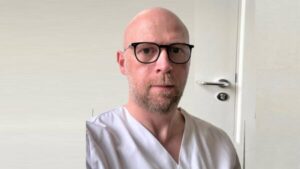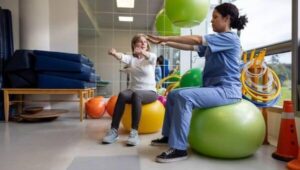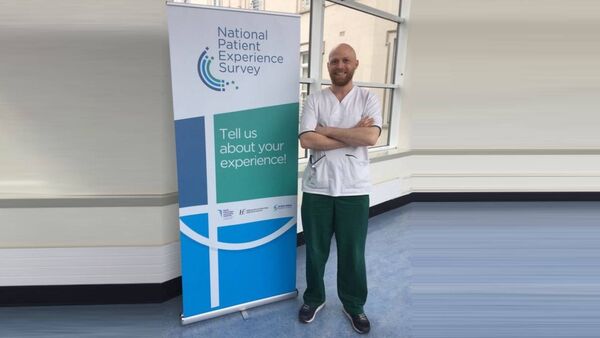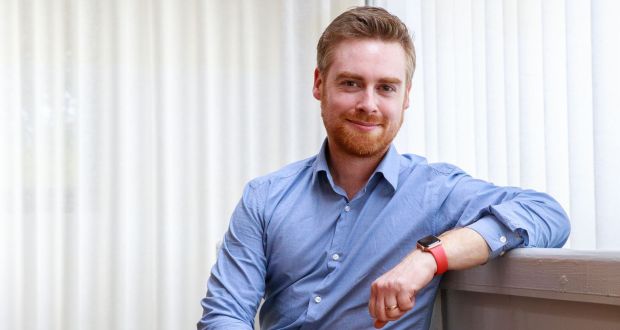James Deasy is an Occupational Therapy Manager in Cork city’s Mercy University Hospital, where he’s worked for over a decade
How did you get started in your role?
I took a circuitous route into Occupational Therapy. As a school leaver I wasn’t sure what I wanted to do so I decided to study what interested me and completed an Arts degree in History and Archaeology in University College Cork.
After graduation I worked for COPE Foundation for a few years as a Special Needs Assistant in schools and a Care Worker in Residential Units. I found that I enjoyed working in a caring role and that is when I discovered Occupational Therapists (OT). The OTs were trying to help clients to live their best lives and be as independent as possible and I admired that.
So at the age of 26 I went back to college and studied a Masters of Science in Occupational Therapy in University of Limerick. Similar to an accelerated degree, it was a two year full-time program that attracted students of a mixed age profile, with many having studied Social Science at undergraduate level. We did a lot of site placements as part of the Masters which I found very valuable.

After leaving college, I worked as a Staff Grade OT in St. Ita’s Community Hospital in Limerick for a year. In St. Ita’s, I would work with older adults and help them to regain their independence in meaningful occupations, i.e. tasks such as washing, dressing, getting out of bed and preparing meals unaided. I would visit the patient’s homes and see how they manage everyday tasks in the home environment. Then I would give advice to them and their families about how best to set up the home environment to make it more suitable, like how to set up the bathroom or bedroom for example. I would also give advice on what equipment might be helpful, e.g. wheelchairs, ramps, dressing aids, etc, advise how to access them and assess people for other aids that may be beneficial.
Following a year in St Ita’s, I took up a Staff Grade Occupational Therapist role in Cork University Hospital. This was a more hospital based role. Here I got experience in an acute hospital setting and did rotations in General Medicine, Hand and Plastics (dealing with hand injuries), Rheumatology, Neurology, Neurosurgery and Rehab of the Older Adult. I stayed here for five years.
Why did you choose to work with Mercy University Hospital?
I joined Mercy University Hospital in 2013 as they offered me an opportunity to be a Senior Occupational Therapist in Care of the Older Adult on St. Mary’s Ward. As a Senior OT I had more responsibility in that I supervised two Staff Grade OTs and was responsible for developing OT initiatives in the area of older adult care.
Most of the patients I worked with had either physical, cognitive or social issues. Some of the common diagnoses patients presented with were chest and urinary tract infection, heart disease, stroke or dementia. As OTs we focus on function. We interview patients and find out what their life was like before they became ill or encountered disability. We discuss their home set up, their social supports, their function, e.g. could they dress, wash or walk unaided, could they take stairs or get their own shopping. OTs look at the person holistically. While a Doctor may focus on a medical diagnosis, an OT is interested in all physical, social, environmental (home), and wellbeing (mood and cognition) factors and determine where the patient may need more support or rehabilitation.
What are you working on at present?
I’m now working as the Occupational Therapy Manager in Mercy University Hospital. I still do some clinical work but I also manage a team of 11 Occupational Therapists. My management work involves developing policies and procedures to ensure we, as OTs, practice in a safe and effective manner. We hold weekly team meetings where we discuss caseloads, issues with patients and ways to improve the OT service in the Mercy. I also go onto the wards to support the OTs as required.
What is the best part of your job?
The best part of my job is seeing patients. It’s the reason I started in the profession. I love finding ways to help provide the best quality of life for them and help them live the best lives they can. I find it really worthwhile and rewarding.
Is there a career moment you are particularly proud of?
Looking back on my career, the high points have definitely been some of the patients I have dealt with. I can recall specific patients from ten years ago who meant a lot to me. Sometimes this is because there had been a specific achievement reached in their therapy but more often than not it’s simply because I went on a therapeutic journey with them and we both know that I did my best for them.

One patient I can recall had worked with me for a year and we developed a great relationship. I assisted him in achieving greater range of motion in his arms, sourced a specialist wheelchair for him and did a home visit assessment. But more than that we developed a mutual respect and appreciation of each other. He even bought me a gift for my wedding which I still have! Patients can tell when OTs bring something of themselves as a person to the interactions and respond to this.
Where do you see healthcare/hospitals/your profession going five years from now?
I hope we’ll see a far greater integration of care from acute hospital services to community services so that the patient receives a more seamless result.
I have also seen ward OT referrals increase dramatically which does show an increasing understanding of the benefits OT can deliver. Hopefully, the OT team will continue to grow in numbers to meet increasing demand and provide high quality care in the future.
And similar to the nursing profession, which has multiple layers and specialist areas, I can see the Occupational Therapy profession develop more clinical specialist roles in the future which again would benefit the patient and the profession.
What’s the best piece of professional advice you’ve received?
A former manager of mine advised that if you are ever asked to give a commitment or give an answer on the spot, say that you’ll ‘have a little think about it’. This works because the person asking now knows that you are considering the request but it also takes the pressure off you to answer immediately. Don’t feel that you have to answer in the moment.
I completed a course on validation theory which is a way of communicating with older adults with cognitive impairment. The course director advised us to address older people as Mr or Mrs, and not by their first name. She stated that we are not the peers of older people and that it is a sign of respect to address them in this way. It also gives the patient the gift of being able to say ‘Call me John’ or whatever their first name is. The dynamic immediately shifts and it makes for a more successful interaction.
If you could go back in time and give yourself a piece of advice at the start of your career, what would that be?
This may sound pretty obvious, but understand that you will learn more from your mistakes than from any successes. When I started off, I used to be crushed by getting things wrong or making a mistake. What I’ve come to realise is that when you make a mistake, you should reflect on it and come up with better answers. See it as an opportunity to grow and don’t be crushed by failure or defeat.
What advice would you give to someone who is thinking about interviewing for this position?
Prepare for the interview. Look into the organisation and know a little about it and what their values are. Also bring something of yourself to the interview. Have specific examples prepared of where you have encountered a scenario, rather than just answering theoretically. Interviewers fully appreciate that nerves can get the better of people but preparation really does help. It shows you care. And obviously as an OT it is important that people show us that they are patient-centered and are willing to learn.
What would you say are the key skills and capabilities necessary to be good at what you do?
Firstly, you really need a genuine curiosity and interest in people in order to be able to help them. OTs use the word occupation to describe the meaningful things that people do every day. These include work, leisure/play and self-care occupations.
Occupational Therapy has a really broad scope. We work in lots of different settings, from the acute hospital setting to mental health settings, to schools, to rehab and the community.
In my setting (the acute hospital) an OT needs to have core skills such as interview and information gathering, the assessment of personal activities of daily living, the moving and handling of patients, cognitive and perceptual assessments and seating and positioning. As a senior therapist in an area such as stroke or ICU care you would then develop specialist skills particular to these areas.

However, in another setting an OT might have a different skill-set. My wife, for example, works as an OT with teenagers with mental illness. Her work looks different to mine but we have the same overarching philosophy and goal.
As OTs we both use occupation as therapeutic modality — using every day or meaningful occupations to help people achieve health and well-being. In my work, that could involve helping someone to achieve independence such as making breakfast or a cup of tea or becoming independent in dressing themselves. In my wife’s work with teenagers, she might have them engage in age appropriate tasks like baking, shopping, art or physical activity to help them return to normal teenage roles like going to school, socialising with friends, engaging in hobbies, etc. The aim is the same; to use meaningful occupation to overcome illness and disability, restore the person’s function, show them that they are capable and help them to heal through engagement in a task.
What is the best career lesson you have learned so far?
Give yourself time to think. You don’t have to answer straight away. Take time to reflect on the best solution if you need to.
I would also say that it’s really important to become really proficient as a Staff Grade OT and focus on helping patients. When you move to Senior OT or OT Manager it becomes less about your own practice and more about the therapists you supervise and how best to nurture, support and develop them.
Which industry professionals should people be following on Twitter/ LinkedIn?
It can be useful to follow the AOTI — the Association of Occupational Therapists in Ireland.
Is there a particular book or resource you’d recommend to someone early in their career?
I found books that dealt with people’s stories about overcoming adversity such as ‘Man’s Search for Meaning’ by Viktor Frankl and ‘Tuesdays with Morrie’ by Mitch Albon quite inspiring and easy to read. ‘The Man who mistook his Wife for a Hat’ by Oliver Sacks is also a great read for anyone who works with people with neurological conditions.
On a more clinical basis ‘Pedretti’s Occupational Therapy: practice skills for physical dysfunction’ is a very valuable resource for someone starting off working in the acute hospital setting.
I’m reading these books at the moment; ‘Lean Daily Management for Healthcare — A Strategic Guide to Implementing Lean for Hospital Leaders’ by Brad White, and ‘Daring Greatly: How the Courage to Be Vulnerable Transforms the Way We Live, Love, Parent and Lead’ by Brene Brown.
To learn more about Mercy University Hospital, and the career opportunities available there, visit their official website.










